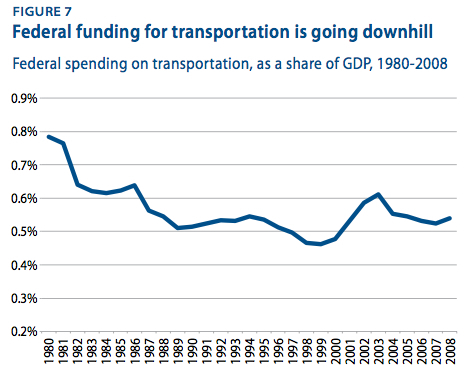Matthew Yglesias's Blog, page 2295
May 26, 2011
Only One Of The Major Approaches To Controlling Health Care Costs Is Unproven

David Wessel's overview of the six think tank plans for long-term debt reduction offered yesterday is generally fairminded, but I think there's a mistake in his description of the ideological divide on health care:
There are two fundamentally different approaches. One relies on market forces, making beneficiaries pick up more of the tab and relying on them to be discerning shoppers and on competition among providers and insurers to control costs. The other relies more on government muscle, enforcing aggregate caps on spending and shifting Medicare from fee-for-service to give providers incentives to care for the whole patient, not to sell individual services.
In short, the debate isn't only about how much savings to squeeze from Medicare, but also about which unproven avenue to restraining health costs is best.
It's difficult to "prove" anything in public policy, but the world has a lot of examples of health care systems that are more statist than Americans. What you see in Canada, and in basically every European country, is that the statist approach does in fact succeed in pushing costs down lower than what we experience in the United States. What you also see is that relatively non-statist approaches like the one they use in Switzerland lead to higher than normal costs for Europe. You also see that the super-statist approach of the United Kingdom leads to extremely low costs. Last, right inside the United States of America we conveniently have a single-payer health insurance system for senior citizens, and a more market-oriented one for non-seniors. And guess what? Medicare is cheaper. The administrative overhead is lower, and the unit cost of services rendered is also lower.
The argument against a statist approach that needs to be taken at least somewhat seriously is the idea that statist approaches make health spending too low. The sky-high costs of the US system generate giant profits that encourage capital to flow into the health care sector. A cheaper system would presumably end up with less equipment, or less R&D or less of something. But if the goal is to spend less money there's tons of evidence on the side of big government.


IP Law Should Encourage Innovation, Not Protect Incumbents

Great piece from John Kay about the state of the intellectual property debate in the UK:
The Hargreaves report on intellectual property (PDF), published last week, is a landmark in the evolution of British policy. Ian Hargreaves concludes the existing intellectual property regime, far from being a spur to innovation and growth, gets in the way. The contrast between this document and the paper on the digital economy Lord Carter prepared for the last Labour government could hardly be more marked. Mr Hargreaves deplores the way government policy has been led by business interests and not evidence of its effects. The Carter report, unintentionally, illustrated his point in every chapter. [...]
As the commercial market is being transformed, anyone who thinks that the policy challenge is to restrict internet piracy has missed the point. Such thinking confuses, as Carter did, the development of successful businesses with the welfare of the industry's established large companies. The result is that UK companies, and the UK government, are now no more than bit players in a play staged on the other side of the Atlantic. The UK government is at least more enlightened than the European Commission, which seems to be playing in quite another show – one where trade associations and naive artists are the only audience.
That's all quite right. We'll know that the time has come to strengthen IP protections for musicians when we start observing some kind of shortage of new bands and new recordings. And it's the same across the board. Have people stopped writing books?


May 25, 2011
Endgame
The summer went right through your tires:
— "Israelis See Netanyahu Trip As Diplomatic Failure".
— How "love child" went mainstream.
— Newt Gingrich is now the Ryan Budget's biggest fan.
— EPI's budget plan.
— The Roosevelt Institute's budget plan.
— Ron Wyden says there's a secret PATRIOT act.
— The root of knowledge.
For members of congress bold enough to keep pushing the Medicare Repeal budget, Ladytron's "I'm Not Scared".


The Declining Federal Commitment To Investing In America's Transportation Infrastructure
Have you noticed how America's transportation infrastructure seems pretty shoddy? Like everything's broken all the time and new projects don't get completed. Why's that? Because government just sucks? Well, maybe. But as CAP's new "Budgeting For Growth" document points out, a big part of the answer is that since the Reagan Revolution we've been disinvesting in this area:

Did transportation spending become less important over the past thirty years? If anything, I'd say they're more important. Over time, we get better at making almost everything. But we don't add hours to the day. Letting people move from place to place in a rapid and convenient manner is very important. That's one of the reasons the CAP budget plan includes a 20 percent increase to the level of gross federal investment in transportation and infrastructure, adjusted for inflation.


Chris Meloni, 'SVU,' and the Role of Men in Feminist Television

Chris Meloni as Elliot Stabler.
By Alyssa RosenbergAt the panel I was on last night, one of the audience members closed out the conversation about asking what the role of men was in feminist television. It's a great question, and it was sort of depressing to walk out of it to find out that Chris Meloni is leaving Law & Order: Special Victims Unit. It's not really shocking that he's made that decision—the show is headed for an overhaul, and Mariska Hargitay, who plays Meloni's partner on the show, is only signed full-time for the first half of the season. I totally get why Meloni would want to move on to other things after more than a decade of an often-grim role as Det. Elliot Stabler. But I'm not looking forward to saying goodbye to a male television character who is constantly engaging with issues of sex and gender.
The show's also been very careful to establish Elliot Stabler as a kind of idealized man. He's a Marine, and not just any Marine, but a hand-to-hand combat specialist. He's supposed to be such an ideal father figure that he's helped deliver almost all of his children, that the department shrink asks him to step in as a father figure to a traumatized victim. Stabler's main flaw is that he gets too angry at victims. The show's ongoing look at police brutality is problematic, mostly because it tries to let the audience enjoy the revenge fantasy of watching Stabler beat up rapists and pedophiles, and then try to make amends for it later, via therapy, confession—the character's Catholic, but that's taking it a bit far.
All that masculinity can get exhausting, but it's probably a necessary pretext for a character on a popular, middlebrow network show who spends both his personal and his professional life dealing with issues of sexuality, sexual violence, and gender expression. If anything, the show's a pretty effective critique of the efficacy of traditional masculinity. Trying to protect your daughter by forbidding her from doing things won't keep her from being diagnosed with bipolar disorder. Beating up pedophiles doesn't actually prevent more people from raping children in the future. But engaging with your colleagues and with victims, talking about sex, sexual violence, and sexual expression, and having empathy with victims can make you better at your job and put bad people in jail—and maybe make you a better husband and father. Law & Order: Special Victims Unit, whatever its flaws and lack of subtlety, made its male main character's struggles with issues of sex and gender a major part of the show. I hope that commitment stays even after Meloni's departure.


The Heritage Foundation's Health Care Plan For "Millenials" Badly Needs an Individual Mandate
The Heritage Foundation's budget proposal is presented in a variety of ways, one of which involves slicing the population up into demographic slices. One such slice is "Millenials" who Heritage defines as those of us born in 1981-1988. We like feature phones and oversize sunglasses:

Now the actual plan here suffers from a familiar problem. What Heritage wants to do, sensibly, is transition us away from a system in which health insurance is closely tied to employment. That means replacing the current tax deduction for employer-provided health insurance with a tax credit that goes to individuals to help subsidize our purchase of insurance. It's a decent idea.
But there's a problem. The employer-based system has a lot of problems, but it creates large risk pools of the kind that are needed to make insurance work. If everyone just buys on the individual market then the incentive for all insurance companies is to focus all its energy on implicit or explicit risk-screening. You're going to need some kind of regulatory definition of what constitutes a minimum acceptable benefits package, you're going to have to make sure that insurers take all customers, and you're going to have to make sure everyone gets a minimum plan. Once you're there, you've got the basic tripod of the Affordable Care Act—regulate, mandate, and subsidize—and then it becomes very sensible for people to disagree around the margin about exactly how generous the minimum plans and subsidies should be. And, indeed, just a few years ago this was the Heritage Foundation's position—regulate, mandate, and subsidize but be relatively stingy about it compared to what people more enthusiastic about government-subsidized health care would want. This is the debate we ought to be having, but instead we're stuck reinventing the wheel.


Gene Sperling: "We Should Be Very Deeply Troubled By the Medicaid Cuts" in GOP Budget

One of the most heartening moments at the Peterson Fiscal Summit was National Economic Council Director Gene Sperling's effort to stand up for Medicaid. Hitting House Republicans for gutting Medicaid isn't the kind of political bonanza that attacking their Medicare plan is, but by the same token it seems more politically realistic to worry that it might action happen. Not if Sperling has anything to do about it:
And I say this to everybody in this room, there is enormous discussion about the revenue side and the Medicare side. But from a policy perspective, from a values perspective, we should be very deeply troubled by the Medicaid cuts in the House Republican plan. I want to make clear what they are. This is not my numbers, this is theirs.
After they completely repeal the Affordable Care act, which would take away coverage for 34 million Americans, according to the Congressional Budget Office. After they've completely repealed that, they do a block grant that would cut Medicaid by $770 billion. In 2021, that would cut the program by 35 percent. Under their own numbers, by 2030, it would cut projected spending in Medicaid by half. By 49 percent. So, of course– I don't think– or imply any negative intentions or– lack of compassion. But there is a tyranny of the numbers that we have to face.
And here's the tyranny of the numbers. Sixty-four percent of Medicaid spending goes to older people in nursing homes or families who have someone with serious disabilities. Another 22 percent goes to 35 million very poor children. Now I ask you, how could you possibly cut 35 percent of that budget and not hurt hundreds of thousands, if not millions of families who are dealing with a parent or a grandparent in a nursing home, or a child with serious disabilities. How is the math possible.
If you tried to protect them mathematically, you would have to eliminate coverage for all 34 million children. Now I know some people didn't like when– the President mentioned that this was going to be very negative for families, for those amazingly brave parents. And he may be one of them in our country, who have a child with autism or Down's and who just are enormously committed and dedicated to doing everything they can to give their child the same chance– every other child has.
But here's the reality. Medicaid does help so many families in those situations. Over the years, we've allowed more middle class families who have a child with autism to get help in Medicaid. There's a medical needy program that says when you spend down– we'll– we'll count the income after you've spent down medical costs.
There's a Katie Beckett (PH) program that was passed by President Reagan that says if you have a child that's in need of institutional care– you can get help from Medicaid. This is– this is a life support for many of these families. But these are the optional programs in Medicaid. These are the ones that go to more middle class families. If you're going to cut 49 percent of projected Medicaid spending by 2030, do you really think these programs will not be seriously hurt?
Well said. The conceit that somehow the magic of "flexibility" will let states absorb these cuts is absurd. The flexibility the House Republicans are talking about is the flexibility to stop covering people in need. That does save money, and that does allow for lower taxes, and there's a case to be made that lower taxes are more important than health care for autistic children. But we should debate the real issue here and not pretend that it's about flexibility.


Would-Be Medicare Eliminators Call The Truth "Mediscare" Because They're Afraid It Works

Watching Paul Ryan earlier today talking at the Peterson Fiscal Summit I was amazed by the number of times he said the word "Mediscare," which is a conservative jargon term for telling the truth about proposals to eliminate Medicare. I'd heard the word a lot over the past couple of weeks, basically ever since we started seeing polls indicating that Kathy Hochul's "make accurate claims about her opponent's strategy for Medicare privatization" strategy was working. So I asked Matthew Cameron to take a look at the history of the word, which seems like a pretty obvious pun. The Lexis-Nexis database doesn't show any usages before the Clinton administration. Then along came Speaker Newt Gingrich and his plan to let Medicare "wither on the vine" and die via a slow-motion privatization plan.
Democrats pushed back against this with a "make accurate claims about their opponents' strategy for Medicare privatization" and then the term "mediscare" was dreamed up as counter-pushback. The David Brooks of the era, William Safire, for example, was very upset in December of 1995:
The under-40 set's inability to see and speak up for its self-interest (justifiable in tots but surprising in thirtysomethings) has given President Clinton license to engage in "Mediscare." This is his shamelessly demagogic campaign to frighten older Americans into thinking that deficit reduction might soon leave them destitute in the snow, and to bamboozle them with pie in the medical sky.
Again, when faced with someone who's strategy is for Medicare to "wither on the vine" and die, putting the program on a slippery slope to privatization and extinction, it seems to me that it's reasonable for people to be alarmed. Note that someone who was 39 when Safire published that column would likely be 55 today and Paul Ryan would desperately be trying to persuade him that he would be exempt from the latest version of privatization.
In September of 1996, Bob Dole was en route to losing a Presidential election and threw himself a pity party:
Instead of working with Republicans and with the Democrats to try to secure, preserve and strengthen Medicare, the President chose to engage in a campaign to scare American seniors. We call it Mediscare! Mediscare! Mediscare! All the ads you see in Florida, all the ads you see in Florida, are negative Mediscare ads!
To my way of thinking, it's difficult to work with people to secure, preserve, and strengthen Medicare when their intention is either to privatize it quickly (Paul Ryan) or to do it more gradually (Gingrich) so as to make it "wither on the vine" and die. But if spending-averse conservatives become convinced that killing Medicare is impossible then it might be possible to get some on board for something like a real plan to reduce the growth in health care spending.


The Continuing Influence of '24′
By Alyssa Rosenberg
According to an interview he gave as part of a project on legal writing, Supreme Court Justice Clarence Thomas looks to the show as the model for his opinions, and is not so much a fan of Agatha Christie. Certainly, 24 is quite clear when it comes to like Jack Bauer explaining how he'll wreck your stomach lining, or the fact that you can't be sort of dead, and I suppose its perspective on the world is easy to discern. But really, what this suggests to me is that Thomas hasn't read a lot of Agatha Christie. When it comes to economy of prose and story, Christie's amazingly good at stating a problem, moving through it quickly, and resolving it in a logical way, all useful things for judicial opinions. And Hercule Poirot's declaration that "Understand this, I mean to arrive at the truth. The truth, however ugly in itself, is always curious and beautiful to seekers after it," is as good a motto, whether you're solving murders in large country houses to which you've been invited for the weekend, or writing briefs.


Occupational Licensing Slippery Slope In Action: Send In The Clowns Edition
A Toronto-area woman thinks clowns and shopping mall santas should need licenses:
"Exotic dancers need a permit; so do massage therapists," pointed out Beaudoin in an interview. "So why not children's entertainers?"
She has been pushing for this legislation for more than a decade. In November, MPP Vic Dhillon tabled several petitions Beaudoin had collected at Queen's Park.
This is one of the dangers of bad policy. People tend to assume that whatever exists must exist for a good reason. Consequently, they tend to argue for change by analogy. Her specific idea is that licensed clowns should need to pass a criminal background check. For any given licensed occupation, "let's ban ex-offenders from doing this" may sound like a decent idea. But people do get convicted of crimes. They serve time in jail. Then they leave. And presumably we want them to go get jobs. Shutting them out of legitimate work is deeply counterproductive.


Matthew Yglesias's Blog
- Matthew Yglesias's profile
- 72 followers




